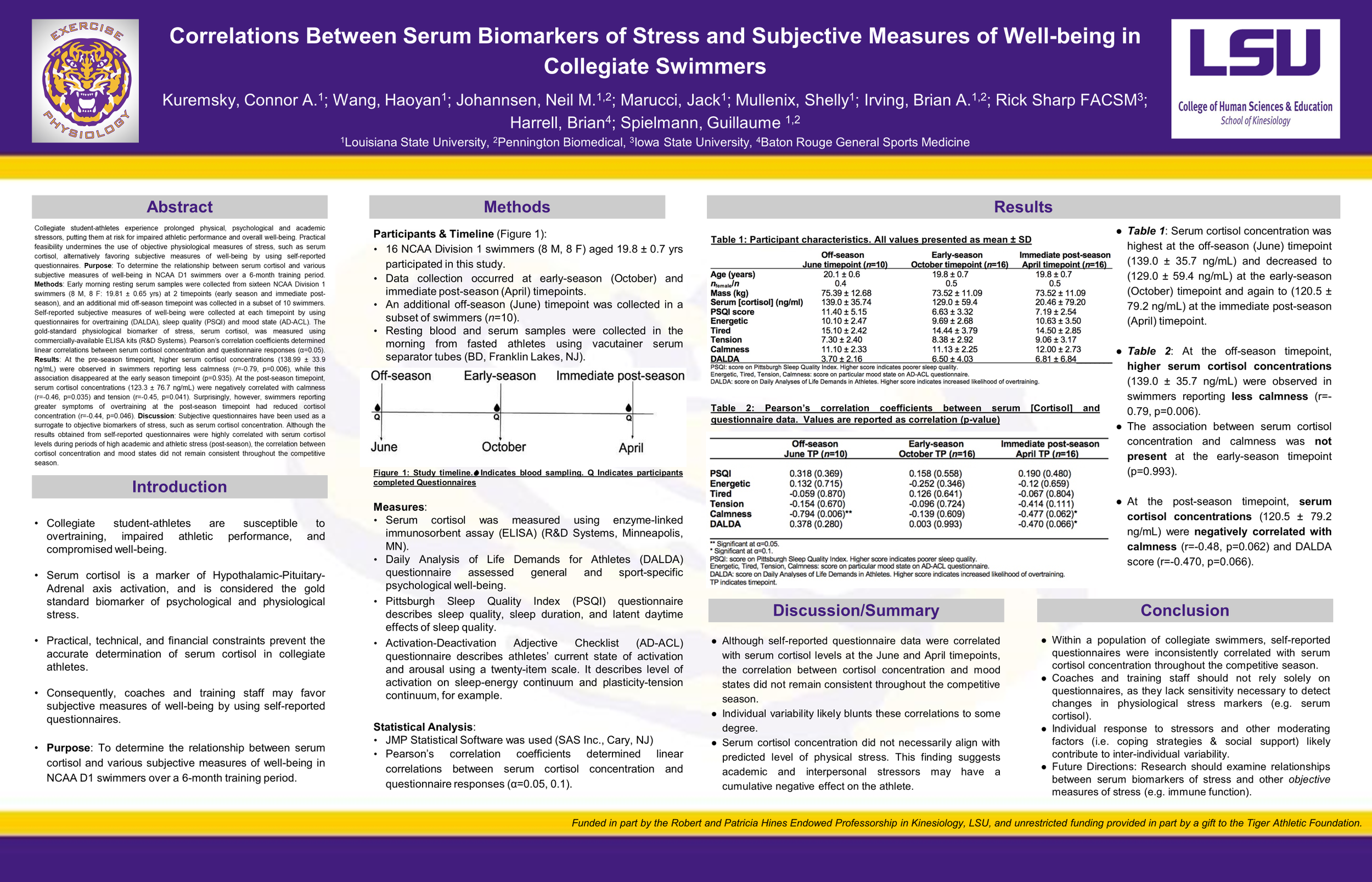The Lab: “Correlations Between Serum Biomarkers of Stress and Subjective Measures of Well-Being in Collegiate Swimmers”
ABSTRACT
Collegiate student-athletes experience prolonged physical, psychological and academic stressors, putting them at risk for impaired athletic performance and overall well-being. Practical feasibility undermines the use of objective physiological measures of stress, such as serum cortisol, alternatively favoring subjective measures of well-being by using self-reported questionnaires.
PURPOSE: To determine the relationship between serum cortisol and various subjective measures of well-being in NCAA D1 swimmers over a 6-month training period.
METHODS: Early morning resting serum samples were collected from sixteen NCAA Division 1 swimmers (8 M, 8 F: 19.81 ± 0.65 yrs) at 2 timepoints (early season and immediate post-season), and an additional mid off-season timepoint was collected in a subset of 10 swimmers. Self-reported subjective measures of well-being were collected at each timepoint by using questionnaires for overtraining (DALDA), sleep quality (PSQI) and mood state (AD-ACL). The gold-standard physiological biomarker of stress, serum cortisol, was measured using commercially-available ELISA kits (R&D Systems). Pearson’s correlation coefficients determined linear correlations between serum cortisol concentration and questionnaire responses (α=0.05).
RESULTS: At the pre-season timepoint, higher serum cortisol concentrations (138.99 ± 33.9 ng/mL) were observed in swimmers reporting less calmness (r=-0.79, p=0.006), while this association disappeared at the early season timepoint (p=0.935). At the post-season timepoint, serum cortisol concentrations (123.3 ± 76.7 ng/mL) were negatively correlated with calmness (r=-0.46, p=0.035) and tension (r=-0.45, p=0.041). Surprisingly, however, swimmers reporting greater symptoms of overtraining at the post-season timepoint had reduced cortisol concentration (r=-0.44, p=0.046).
DISCUSSION: Subjective questionnaires have been used as a surrogate to objective biomarkers of stress, such as serum cortisol concentration. Although the results obtained from self-reported questionnaires were highly correlated with serum cortisol levels during periods of high academic and athletic stress (post-season), the correlation between cortisol concentration and mood states did not remain consistent throughout the competitive season. Funded in part by the Robert and Patricia Hines Endowed Professorship in Kinesiology, LSU, and unrestricted funding provided in part by a gift to the Tiger Athletic Foundation.
RESEARCHERS
Kuremsky, Connor A.1; Wang, Haoyan1; Johannsen, Neil M.1,2; Marucci, Jack1; Mullenix, Shelly1; Irving, Brian A.1,2; Rick Sharp FACSM3; Harrell, Brian4; Spielmann, Guillaume 1,2
REFERENCE
Kuremsky, C.A., Haoyan, W., Johannsen, N.M., Marucci, J., Mullenix, S., Irving, B.A., Sharp, R.L., Harrell, B. and Spielmann, G., 2018. Correlations Between Serum Biomarkers Of Stress And Subjective Measures Of Well-being In Collegiate Swimmers: 499 Board# 5 May 30 100 PM-300 PM. Medicine & Science in Sports & Exercise, 50(5S), p.111.
